مديرو العمليات مثل قادة الأوركسترا. فكما ينسق قائد الأوركسترا بين جميع العازفين المختلفين ويضمن تقديم أداء موسيقي متناغم، فإن مدير العمليات يشرف على المهام والموارد وينسقها للحفاظ على تزامن الأعمال.
وسواء أكان مدير العمليات يقوم بمراجعة العمليات لإزالة التكرار وجعل سير العمل فعالاً من حيث التكلفة أو إدارة برامج ضمان الجودة السريعة الوتيرة، فإن مدير العمليات يبذل أقصى ما في وسعه للحفاظ على استمرارية الشركة. 💡
لفهم مدى تعقيد هذا المنصب، اطلع على يوم في حياة مدير العمليات. إلى جانب الواجبات اليومية، سنستكشف جوانب مختلفة من هذا الدور المهم، بما في ذلك:
- المؤهلات المرغوبة
- الأدوات والتقنيات التي يستخدمها مديرو العمليات
فهم دور مدير العمليات
يرتدي مدير العمليات العديد من القبعات في المؤسسة. فهو يشارك في العديد من العمليات والإجراءات الحيوية - من التخطيط الاستراتيجي والكفاءة تجميع المهام لضمان الجودة. يتواصلون عادةً مع الإدارات والأقسام الأخرى داخل الشركة ولكنهم قد يتعاملون أيضًا مع العملاء من حين لآخر.
وبسبب الطبيعة الديناميكية للوظيفة، يجب أن يتمتعوا بخبرة تقنية وتجارية قوية والثقة لاتخاذ قرارات حاسمة أثناء التنقل. يجب أن يتمتعوا أيضاً بمجموعة واسعة من المهارات الشخصية، مثل إدارة الوقت والتواصل
سنقوم بتفصيل الوظائف الثلاث الرئيسية لمدير العمليات في الأقسام التالية:
1. التخطيط وتحديد الأولويات لزيادة الكفاءة
يجب أن يفهم مدير العمليات أولاً أهداف العمل الشاملة للمؤسسة بشكل كامل. وتتمثل مهمتهم في مواءمة أهداف الشركة عالية المستوى مع أهداف فرق العمليات من خلال بناء استراتيجية عمليات فعالة .
أثناء عملية وضع الاستراتيجية، يركز مدير العمليات على:
- تخطيط العمليات: يحدد مدير العمليات الإجراءات التي يجب أن تتخذها المنظمة أو فرق محددة ويحدد المواعيد النهائية لها. وستكون هذه الخطط هي أساس مدير العمليات فيتخطيط القدرات واستراتيجيات إدارة المخاطر
- تحديد الأولويات: سيتشاور مدير العمليات مع كبار المديرين الآخرين لتحديد الأنشطة التي يجب أن تكون في مرتبة أعلى في قائمة مهام الفريق. تحديد أولويات بعض الأهداف في وقت واحد يمنع مشاكل الجودة في المستقبل
- تحديد مقاييس الأداء: يحتاج مدير العمليات إلى قضاء بعض الوقت في تحديد مؤشرات الأداء الرئيسية (KPIs) التي ستحدد نجاح العملية وتضيف إلى صحة الشركة في البيانات المالية
2. تصميم العمليات ومراقبة وإدارة برامج ضمان الجودة وإدارتها
بالنظر إلى أهداف الشركة وقوانينها ومعاييرها الصناعية، يقوم مدير العمليات بصياغة السياسات وسير العمل للمؤسسة بأكملها. ويجب عليه تحديث هذه السياسات وتحسين العمليات مع ورود معلومات جديدة.
يجب على مدير العمليات التنسيق مع الأقسام الأخرى المشاركة في تقديم المنتجات والخدمات. وقد يشمل ذلك تشغيل ضمان الجودة برامج للتحقق من كفاءة الإنتاج، وفعالية تكلفة الخدمات اللوجستية الحالية، والتخصيص الأمثل للموارد البشرية.
إذا كان الأداء التشغيلي غير مُرضٍ، قد يقوم المدير بإعادة تصميم أو تحسين العمليات لجعلها فعالة من حيث التكلفة وتحقيق نتائج إيجابية.
كما يشرف مدير العمليات أيضًا على العمليات أثناء سيرها، سواء في الموقع أو في الميدان. وعلاوة على كل شيء، يراقبون الميزانيات، ويقومون بتحليل التكلفة إلى الفائدة لتقييم الأثر المالي للقرارات التشغيلية. 💵
نصيحة احترافية: مجانًا قالب تحليل تكلفة وفوائد النقر يتيح لمديري العمليات إجراء تقييم سريع لفعالية تكلفة العمليات المتاحة قبل الاستثمار في إحداها. وبفضل تصميمه البسيط المرمز بالألوان، يبسط القالب عملية اتخاذ القرارات المعقدة.
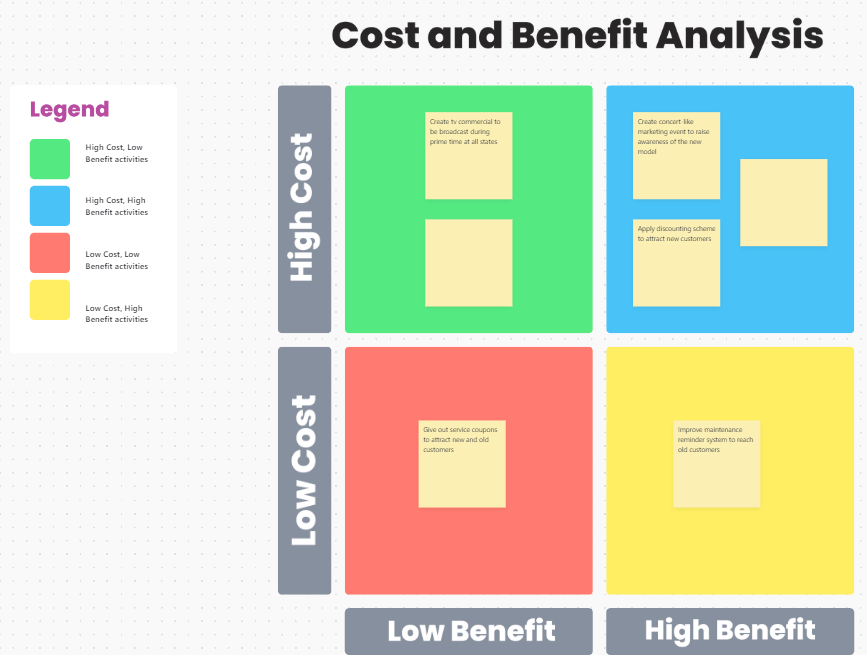
كليك أب نموذج تحليل التكلفة والفائدة يساعد مديري العمليات على اتخاذ قرارات مسؤولة مالياً
/ctaBtn/الأخضر https://app.clickup.com/signup?template=t-200519120 تنزيل هذا النموذج /%ctaBtntn/
3. إدارة الموظفين
غالبًا ما يتعاون مدير العمليات الرائع مع مدير الموارد البشرية للقيام بما يلي:
- تتبع جداول الموظفين
- إلحاق الموظفين الجدد بالعمل
- جدولة العمل بفعالية، بما يتماشى مع مجموعات المهارات وتوافر الموظفين
- توثيق أفضل الممارسات وإجراءات التشغيل القياسية (SOPs)
- ابتكار برامج تدريبية مؤثرة لتحسين كفاءة فرق الإنتاج
- تنفيذ أنظمة جديدة لحضور الموظفين وتتبع الوقت
- كتابة كتيبات العمليات لتحسين الكفاءة وإنتاجية الفريق
- تنفيذ تدابير السلامة في المصانع والمباني المكتبية
نصيحة احترافية: لتقييم قدرة الفريق وتوزيع المهام بفعالية، يمكن للمدراء استخدام قالب جدول الموظفين ClickUp .
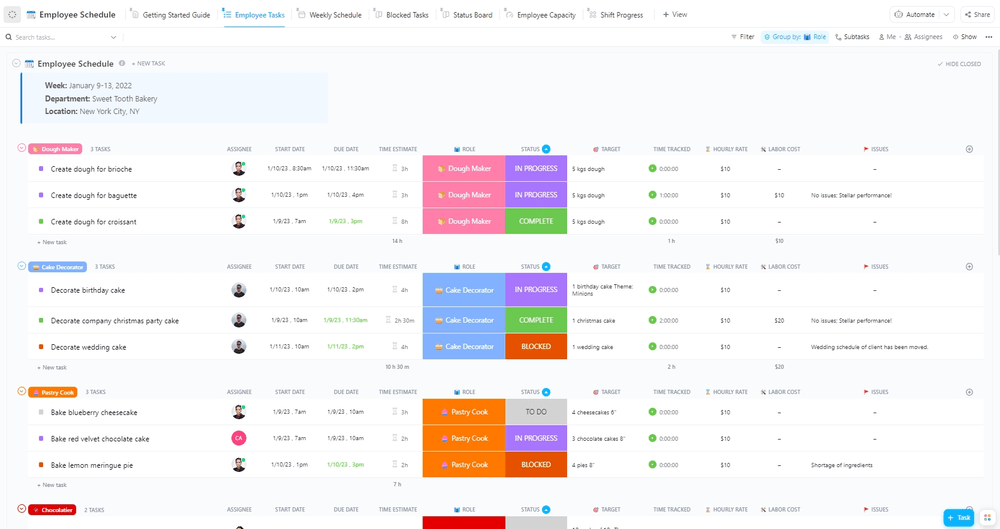
بغض النظر عن حجم فريقك، فإن قالب جدول الموظفين الخاص بـ ClickUp يجعل من السهل تنسيق أعباء العمل
يتميز القالب بعروض مختلفة، مثل اللوحة والتقويم، مما يسمح للمديرين بتقييم العمل من زوايا مختلفة. كما يمكنهم أيضاً تتبع التقدم المحرز نحو المراحل الرئيسية الخاصة بالمشروع.
/ctaBtn/الأخضر https://app.clickup.com/signup?template=t-900200017485 تنزيل هذا القالب /%ctaBtntn/
يوم نموذجي في حياة مدير العمليات
كل يوم فريد من نوعه بالنسبة لمدير العمليات. لقد وصفنا أدناه ما يستلزمه يومهم العادي.
في الصباح
عادةً ما يكون مدير العمليات من أوائل الأشخاص الذين يصلون إلى المكتب. وهذا يسمح لهم بتصفية ذهنهم حتى يتمكنوا من مواجهة تحديات اليوم. فهم يتأكدون أولاً من أن كل شيء جاهز لبدء العمليات التشغيلية. 🌄
لمعرفة ما يخبئه لهم اليوم ووضع خطط فعالة، يقوم مدير العمليات بمراجعة قائمة المهام والتقويم. كما أنهم يتحققون من صندوق البريد الإلكتروني الخاص بهم لمعرفة ما إذا كانت هناك أي مشاكل تحتاج إلى معالجة عاجلة.
نصيحة احترافية: عادةً ما يستخدم مديرو العمليات ذوو الإنتاجية العالية حلاً لإدارة المهام مثل انقر فوق للحفاظ على تنظيم الأشياء رقميًا. على سبيل المثال قائمة التحقق من المهام الخاصة بـ ClickUp هي الميزة المفضلة للعديد من المديرين لأنها تبسّط المهام المعقدة وتجعلها أكثر قابلية للإدارة.

تعمل قوائم مراجعة المهام في ClickUp على تعزيز إنتاجيتك من خلال السماح لك بتقسيم المهام الصعبة إلى أجزاء أصغر
حل المشكلات اليومية (مع أمثلة)
يُخصص معظم يوم مدير العمليات لحل المشاكل الناشئة. 🚨
على سبيل المثال، يقوم المورد بالإبلاغ عن تأخره في تسليم المواد الخام بسبب الظروف الجوية. في هذه الحالة، يقوم مدير العمليات بتقييم المخزون الموجود، ويعطي الأولوية لإنتاج المنتجات الأكثر إلحاحًا، ويتيح للعملاء معرفة التأخيرات المحتملة. قد يتواصلون أيضًا مع موردين بديلين لتقليل الاضطرابات إلى أدنى حد ممكن.
في حالة حدوث عطل مفاجئ في المعدات، يقوم مدير العمليات باستدعاء أو تجميع فريق لمعالجة الإصلاحات على الفور. إذا لم يكن الإصلاح السريع ممكنًا، يحدد المدير كيفية إكمال جميع الأعمال باستخدام الآلات المتاحة ومنع التأخير في الإنتاج.
يظهر سيناريو آخر مرهق لحل المشاكل عندما يضطر أحد الموظفين الرئيسيين إلى أخذ إجازة مرضية غير متوقعة لفترة غير محددة. وهنا يتم تكليف مدير العمليات بإيجاد بديل مؤقت.
لذا، على مدير العمليات أن يكون جاهزًا طوال اليوم للتعامل مع هذه المشاكل غير المتوقعة، ولهذا، فإن إدارة المخاطر يجب أن تكون اللعبة من الدرجة الأولى.
نصيحة احترافية: عند مواجهة قرار صعب، يمكن لمديري العمليات اللجوء إلى نموذج مصفوفة مخاطر قيمة ClickUp . يتيح لهم القالب سرد جميع الحلول للمشكلة، وتعيين تصنيفات القيمة والمخاطر، وتصور موقع كل خيار في مصفوفة السبورة البيضاء. بمجرد أن يظهر الحل الأمثل، يمكن للمدير تحديد أولوياته في مساحة العمل حتى يتمكن الفريق من بدء العمل عليه في أسرع وقت ممكن.
/ctaBtn/الأخضر https://app.clickup.com/signup?template=t-222094710 تنزيل هذا القالب /%ctaBtntn/
الاجتماعات
عادةً ما يشارك مديرو العمليات في العديد من الاجتماعات والمكالمات أو يقودونها على مدار اليوم، مثل
- مديرين آخرين: عادةً ما يستضيف مدير العمليات اجتماعات أسبوعية مع جميع المديرين ورؤساء الأقسام. خلال هذا الاجتماع، يقومون بتلخيص ما تم إنجازه في السابقعمل الأسبوع السابق والتخطيط للاجتماع التالي. هذه فرصة لتسليط الضوء على المشاكل ومراجعة التقارير
- العملاء: يميل العملاء، خاصة الجدد منهم، إلى طرح العديد من الأسئلة والمخاوف. يجيب مدير العمليات على بعضها، ويشرح لهم كيف ستقوم الشركة بأداء المهمة التي تم تعيينها من أجلها
- كبار المديرين التنفيذيين: يقوم مدير العمليات برفع مشاكل العمليات أو الجودة إلى الإدارة العليا، مثل الرئيس التنفيذي والمدير العام، لإيجاد حلول لها في الوقت المناسب
نصيحة للمحترفين: وجود جدول أعمال الاجتماع2. تكنولوجيا المعلومات (IT): مراقبة البنية التحتية للشبكة وصيانتها وتحسينها، والإشراف على العمليات الأمنية وعمليات نقل البيانات، وإدارة ترقيات الأجهزة والبرمجيات، وتحليل أداء النظام واقتراح التحسينات، وحل الصعوبات التقنية الكبيرة
- الرعاية الصحية: طلب وتتبع المخزون (المعدات واللوازم الطبية)، والحفاظ على سجلات المرضى، ووضع سياسات وإجراءات المنشأة، وضمان الامتثال، ووضع استراتيجيات لتحسين تجربة المريض
- البيع بالتجزئة: بناء العلاقات مع العملاء والحفاظ عليها، وإدارة المخزون، ومراقبة الطلبات، والشحنات، وتوليد المبيعات، والتحقيق في شكاوى العملاء واقتراحاتهم
مهارات ومتطلبات مدير العمليات
نظراً لتنوع وأهمية إدارة العمليات، يجب أن يمتلك المرشحون المؤهلات والمهارات المناسبة لكي يتم النظر في تعيينهم في هذا المنصب. تعرّف عليها في الأقسام أدناه.
المتطلبات الفنية
قد يبحث مسؤولو التوظيف عن ما يلي عند تعيين مديري العمليات:
- التعليم: عادةً ما تكون درجة البكالوريوس أو أعلى في إدارة العمليات أو إدارة الأعمال أو مجال ذي صلة. تشير الدرجة العلمية إلى معرفة الفرد النظرية
- خبرة عملية مثبتة: تُعد الخبرة في إدارة العمليات مثالية، ولكن الخلفية في الأدوار القيادية الأخرى مناسبة أيضًا
- المهارات الصعبة: تشمل بعض المهارات الأكثر طلباً الكفاءة في تحليل البيانات وإدارة الميزانية وإدارة المشاريعمنهجيات مثل أجايل وLean Six Sigma. الخبرة في برامج الأعمال والإدارة ذات الصلة أمر مرغوب فيه
- الشهادات: على الرغم من أن الشهادات ليست ضرورية دائمًا، إلا أنها تُظهر رغبة المدير في مواصلة تطوير مهاراته. صالحةشهادات لمديري العمليات تشمل:
- شهادة مدير معتمد (CMC)
- محترف إدارة المشاريع (PMP)
- شهادة الإشراف والإدارة الأمنية المعتمدة (CSM)
- محاسب إداري معتمد (CMA)
- مهارات خاصة بالصناعة: يمكن أن تزيد المعرفة والخبرة في الصناعة المحددة من فرص المدير في النجاح في هذا المنصب
الفطنة في مجال الأعمال والإدارة
يجب أن يتمتع مدير العمليات بمهارات تحليلية لفهم العمليات التجارية وإدراك ما يجب القيام به للحفاظ على سير الشركة ونموها. كما يجب أن يكونوا قادرين على التفكير الاستراتيجي، وتقييم المخاطر والفرص، وأن يكون لديهم المعرفة الأساسية لتصفح البيانات المالية.
مهارات إدارة الوقت والعمليات
نظرًا لأنه يتعين عليهم التوفيق بين العديد من المهام والموارد، يجب أن يكون مدير العمليات منظمًا. وتتمثل مهمتهم في وضع الجداول الزمنية مع مراعاة الجداول الزمنية للمشروع وتوافر الموظفين
غالبًا ما يستخدم مديرو العمليات مخططات جانت ( المتاحة داخل ClickUp ) لإنشاء الجداول الزمنية للمشروع وتتبعها.
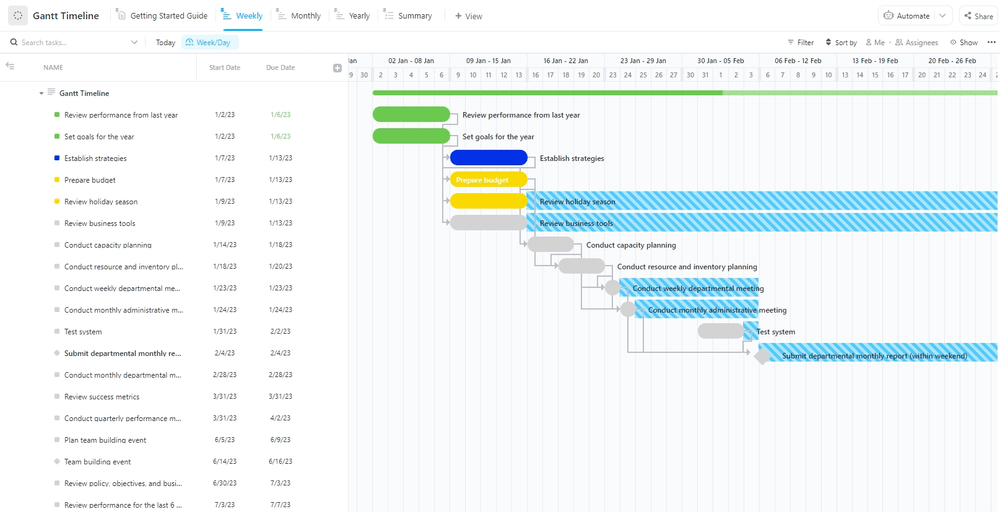
يوفر قالب جانت للجدول الزمني من ClickUp طريقة فعالة وجذابة لتصور جدول مهامك لأي مشروع
مهارات التعامل مع الآخرين ومهارات التواصل
يتفاعل مديرو العمليات مع جميع الأطراف المشاركة في العمل تقريباً. ويشمل ذلك الموظفين والمديرين الآخرين والمديرين التنفيذيين والموزعين والعملاء. ولهذا السبب يجب أن يكونوا مهذبين ويحافظوا على علاقات قوية. يجب أن يكونوا قادرين على مشاركة الأفكار بفعالية في أي وسيلة.
مهارات الإدارة والتدريب
عند إدارة الموظفين، يكون مدير العمليات مسؤولاً عن تدريب الموظفين ومساعدتهم على تطوير مهاراتهم الإجرائية و أن يصبحوا أكثر إنتاجية .
الأدوات والتقنيات التي يستخدمها مدراء العمليات في المهام اليومية
يمكن أن تساعد الإرشادات التالية مديري العمليات على أن يصبحوا استثنائيين في عملهم.
1. الاستفادة من قوة البرمجيات والأتمتة
بمجرد أن تكتسب فهمًا عميقًا لجميع العمليات التشغيلية، ابدأ بإدخال التكنولوجيا. سيتيح لك هذا الأمر لك ولفريقك العمل بكفاءة أكبر، وأتمتة بعض المهام العادية، ومنع أوقات التعطل المتعلقة بالتأخيرات الإدارية. تتضمن بعض البرمجيات الشائعة التي يستخدمها مديرو العمليات ما يلي:
- أدوات إدارة المشاريع
- أنظمة الاتصالات
- أدوات مكتب المساعدة
- حلول إدارة العمليات التجارية
مع نظام أساسي شامل مثل ClickUp، يمكنك الحصول على كل ما يلي أدوات إدارة العمليات تحت سقف واحد 😍
يمكن أن يكون ClickUp مركزًا لجميع عمليات سير العمل الخاصة بك في مجال المعرفة والتخطيط وتتبع التقدم. استخدم مهام ClickUp وموقعه الأصلي قدرات إدارة المشروع لجدولة المهام وتعيينها. قم بتقسيمها إلى مهام فرعية أو قوائم مراجعة وتحديد التبعيات لإنشاء سير عمل سلس على مستوى الفريق.
تصور جميع الأعمال القادمة في واحد من أكثر من 15 طريقة عرض قابلة للتخصيص في ClickUp -الكلاسيكية عرض اللوحة و عرض التقويم هي المفضلة لدى مديري العمليات!

تصور جميع الأعمال القادمة وجدولة المهام بكل سهولة باستخدام ClickUp
هذا ليس كل شيء - قم بتبسيط عمليات دعم العملاء وجمع الملاحظات باستخدام عرض النموذج القابل للتخصيص في ClickUp . ستقوم المنصة بتحويل الردود تلقائيًا إلى مهام لتوفير الوقت الذي تقضيه في معالجتها يدويًا.
للتواصل مع فرق العمل أو الأفراد لحل المشاكل بسرعة، استخدم عرض الدردشة أو الإشارة إلى زملاء الفريق في تعليقات المهام. وإذا كنت ترغب في تبادل الأفكار حول استراتيجيات جديدة وتخطيط العمليات في إعداد مرئي أكثر، استخدم ClickUp Whiteboards و الخرائط الذهنية التي تدعم التعاون في الوقت الحقيقي.
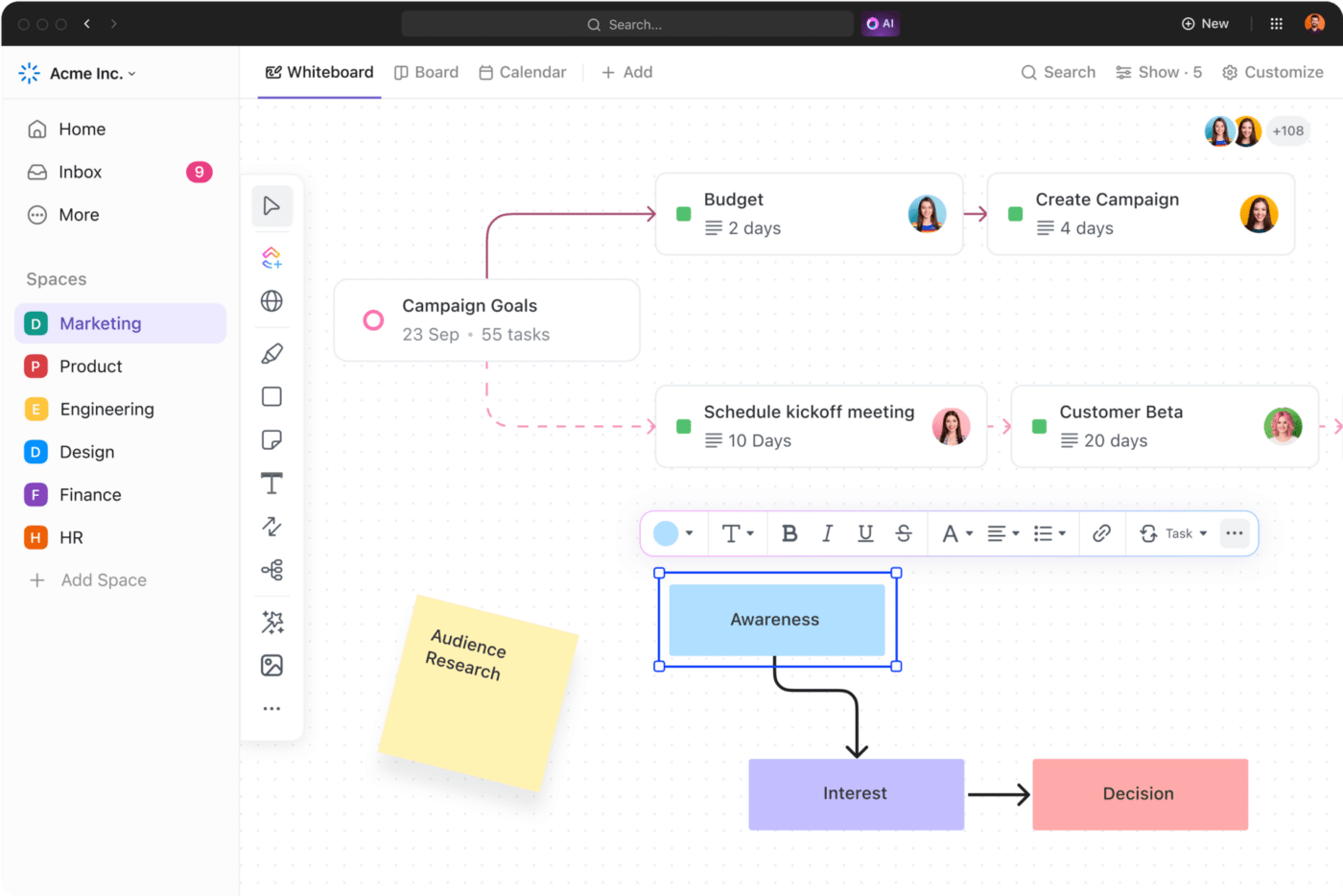
قم بالعصف الذهني بشكل جماعي وكن مبدعًا بمساعدة سبورة ClickUp Whiteboards
قراءة إضافية: الأفضل قوالب إدارة المشاريع لفرق العمليات
2. البيانات هي أفضل صديق لك
إذا لم تقم بقياس الأداء، فمن الصعب معرفة مدى نجاح عملياتك. تمكنك البيانات من أن تكون موضوعيًا وتتبع التقدم التدريجي. وهي أيضًا مفتاح تحديد الاختناقات قبل أن تتفاقم إلى مشاكل كبيرة.
تحتاج أيضًا إلى طريقة فعالة لتنظيم جميع البيانات بحيث تكون في متناول يدك. أدخل مستندات ClickUp ، مدير مستندات المنصة ومحررها مع ميزات تنسيق غنية. وهو مزود بـ مساعد ذكاء اصطناعي أصلي يمكنه
- معالجة طلبات البيانات الخاصة بالمهام والعمليات في مساحة عمل ClickUp الخاصة بك
- طرح أفكار حلول لفرق العمليات (مع أكثر من 100 مطالبة)
- إنشاء الجداول الزمنية للمشروع وأدلة العمليات
- تلخيص ملاحظات الاجتماعات

نظم بحثك ولخصه بمساعدة مستندات ClickUp Docs والذكاء الاصطناعي
3. لا تخف من تحليل المنافسين
يجب أن تنظر إلى العمليات والمقاييس التي تستخدمها الشركات والمدراء الذين تتطلع إلى استخدامهم. فكر في كيفية تطبيقها في سير عملك. لكن احرص على عدم المبالغة في ذلك. قد لا تعمل بعض التكتيكات في مجال تخصصك المحدد.
قراءة إضافية: اطلع على أهم ما جاء اليوم أدوات تحليل المنافسين .
4. الإشراف ولكن بدون إدارة دقيقة
يُصعّب العديد من مديري العمليات الأمور على أنفسهم من خلال الإشراف الدقيق على جميع الموظفين - وهذا لن ينجح.
الهدف هو أن يعمل الموظفون بشكل مستقل دون الحاجة إلى الإشراف المستمر. بينما يجب عليك الإشراف على العمل لضمان سير العمليات اليومية بسلاسة، من المهم أن تستثمر في تدريب الموظفين وثق بفريقك. وبهذه الطريقة، يمكنك التركيز على المهام الأكثر أهمية - تبسيط سير العمل والأداء.
يسمح لك ClickUp بتتبع التقدم المحرز من بعيد عند اكتمال العمل. يمكنك تعيين الأهداف وأهداف قابلة للقياس. تصفح أكثر من 50 بطاقة تقرير ورتبها على بطاقات التقرير الخاصة بك لوحة معلومات ClickUp . وبهذه الطريقة، يمكنك الحصول على نظرة عامة سريعة على عمليات الفريق أو الشركة بأكملها في الوقت الفعلي.
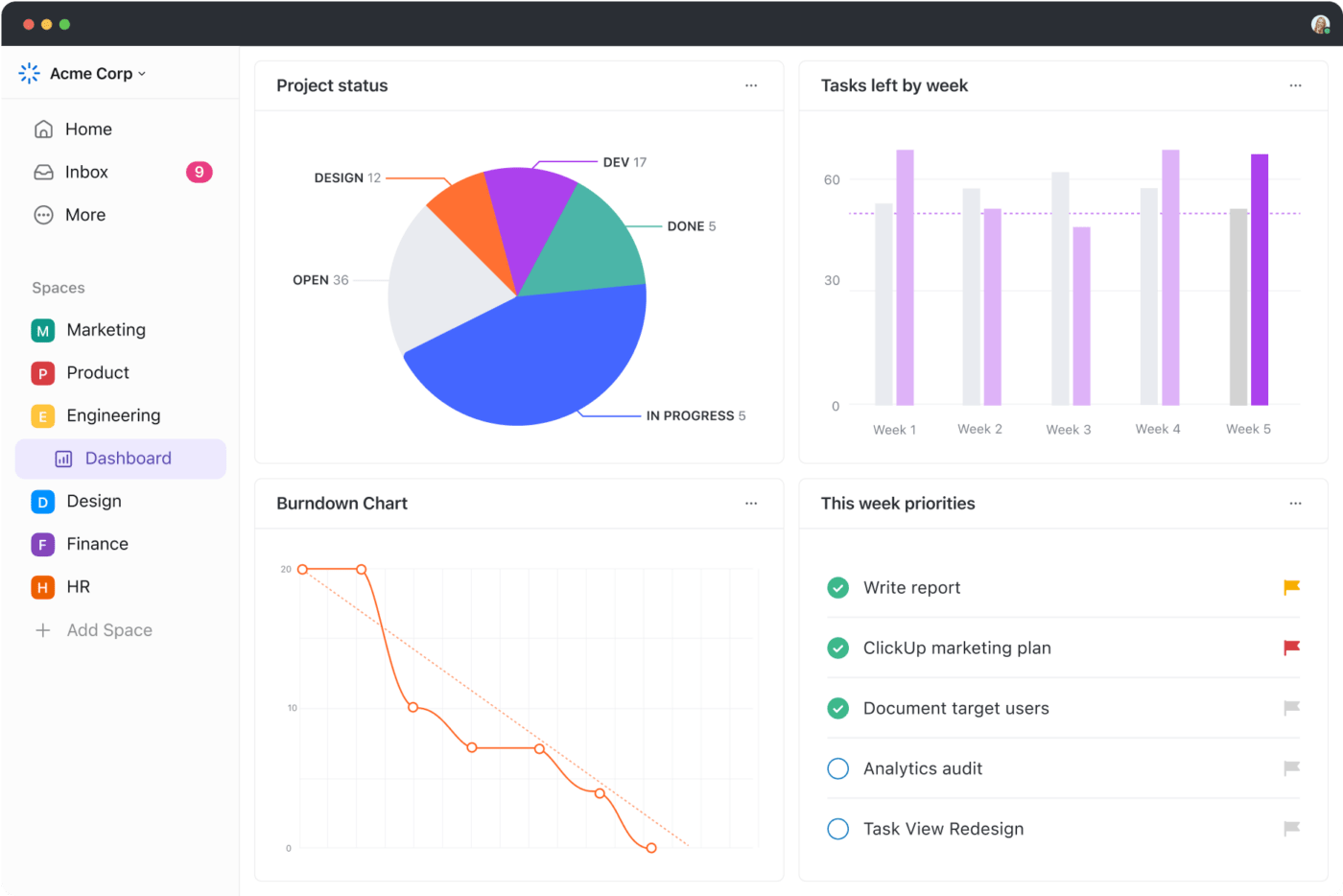
أنشئ لوحة معلومات ClickUp حتى تتمكن من تقييم تقدم كل عملية وأداء الفريق بسرعة
5. تحقيق التوازن بين الكفاءة والجودة
في عالم العمليات، لا ينبغي أن تتأثر الكفاءة ولا الجودة. على الرغم من أنه ليس من الممكن دائمًا تحقيق كليهما على أكمل وجه، إلا أنه من الضروري أن تجعل استراتيجية عملياتك قوية في كلا الجانبين. إن السعي الدائم لتحقيق هذا التوازن سيعزز ربحية شركتك واستدامتها، مما يجعلها رائدة في السوق. ⚖️
تخطيط وتشغيل الأعمال التجارية بكفاءة مع ClickUp
في هذه النظرة الخاطفة على الحياة اليومية لمدير العمليات، تكون قد تعرفت على الواجبات والتحديات المحددة التي ينطوي عليها هذا الدور. في حين أن الوظيفة معقدة، إلا أنه مع اتباع النهج الصحيح والمهارات والتحفيز الصحيح، يمكن لأي مدير عمليات أن يقود الكفاءة والابتكار بنتائج ممتازة.
إن وجود أداة لدعم هذه العمليات يمكن أن يساعدك في الوصول إلى ذلك بشكل أسرع. اشترك في ClickUp اليوم، واستخدم واحدة من قوالب العمليات والميزات لـ العمل بذكاء - وليس بجهد أكبر!

